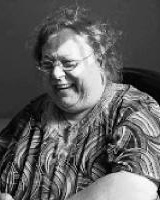
Sally Gross
Biography
Sally Gross was born August 22, 1953 in Wynberg, Cape Town and passed away February 14, 2014. She was a South African anti-apartheid and intersex activist, a member of the African National Congress during the apartheid era, and the founder of Intersex South Africa. Gross acted as a mentor to intersex activists around the world. Gross was born to a Jewish family, classified as male, given a masculine name, and raised as a boy. Despite it being protocol at the time, doctors did not perform surgery to fit binary ideas of “male” or “female” at the time of her birth. The discrimination Gross faced during her life as an intersex individual led her to a lifetime of activism for more ethical treatment of the intersex community in South Africa.
Due to her anti-apartheid stance, Gross was led away from South Africa and attended the University of Haifa for two years before returning to fight the apartheid regime. Although born to a Jewish family, Gross was drawn to Catholicism, adapted the Catholic faith, and was baptized in early 1976. She fled South Africa in May 1977, on the advice of colleagues in the African National Congress, moving to Botswana and then later to Israel where her parents had settled. In 1981, Gross became a novitiate in the Dominican Order in Oxford, England. She was ordained a priest in 1987, and then taught moral theology and ethics at Blackfriars, Oxford. She holds a master's degree from Oxford University. She was then assigned as sub-prior to the Cambridge priory. In 1987, Gross served as a delegate in an ANC conference, then headed by Thabo Mbeki, in Dakar, Senegal.
She was invited back to teach in her home country of South Africa by the Dominicans once the South African ban on the ANC was lifted in 1990. Gross gained Israeli citizenship but lost her South African citizenship during her time as a refugee. However, her South African citizenship was restored in 1991. In the early 1990s she began to explore issues around her body and identity; she took a leave of absence from the Dominican Order and moved to the South Coast of England. During her time there Gross had a time of immense self-discovery. Gross, ultimately identified herself as female. Because Gross identified female, her clerical status was stripped, and her religious vows were annulled. Gross could no longer serve in the priesthood as a woman. After undergoing medical tests to formally confirm her intersex status in 1993 at age 40, Gross began living as a woman and going by Sally. After a struggle with Home Affairs in South Africa, she eventually was granted a passport and a birth certificate with female sex markers on the basis of a mistaken original classification.
She later acquired an interest in the Religious Society of Friends (Quakers) and Buddhism. Following her own personal experiences, Gross became a advocate and activist for intersex rights, advocating that the protocol of performing “corrective” surgery upon the birth of an intersex child be eradicated and working to raise awareness, erase stigma, and transform South Africa’s gender normative ideals. In 2000, Sally secured the first known mention of intersex in national law, with the inclusion of "intersex" within the definition of "sex" in the anti-discrimination law of the Republic of South Africa. Since then, she helped to draft legislation on the Alteration of Sex Descriptors, and the Promotion of Equality. Gross was a founder of Intersex South Africa, an autonomous intersex community organization affiliated with the Organization Intersex International. Gross was a public speaker on intersex issues, and she was interviewed by the BBC World Service on intersex and the Caster Semenya affair in September 2009. She appears in a video for “It Gets Better South Africa” in April 2013. Gross also participated in the first International Intersex Forum in 2011 and appears in the documentary Intersexion. Via Skype, Gross presented a paper entitled "Not in God's Image: Intersex, Social Death and Infanticide" to a conference on Intersex, Theology and the Bible in March 2013 by the Manchester University Religion and Civil Society Network. The Daily Maverick newspaper reported that Gross died alone in her apartment in Cape Town on 14 February 2014. Gross’ personal documents, photographs, and memorabilia can be found in the Sally Gross Collection at GALA, Johannesburg, South Africa. Gross is remembered as a gentle and fearless advocate and mentor for the intersex community.
(This biographical statement drafted by Levi Alter with revisions by Alysia van Looy from the sources listed below.)
Biography Date: November 2020
Additional Resources
South African History Online https://sahistory.org.za/people/sally-gross
Daily Maverick Article https://www.dailymaverick.co.za/article/2014-02-25-sally-gross-the-fight-for-gender-equality-loses-a-giant/
Information on The Sally Gross Collection at GALA: https://lgbtqreligiousarchives.org/collections/gross-sally-papers
Tags
Trans activism | Intersex activism | Africa | South Africa | Catholic (Roman) | Friends/Quakers | Buddhist | Clergy Activist | GALA (South Africa)
Citation
“Sally Gross | Profile”, LGBTQ Religious Archives Network, accessed February 18, 2026, https://lgbtqreligiousarchives.org/profiles/sally-gross.
Remembrances